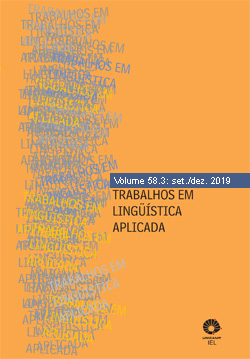Abstract
Anchored in the theoretical perspective of the Bakhtin Circle, this article proposes a reflection on criteria for the elaboration and evaluation of written production tasks for the teaching of Portuguese as an Additional Language (PLA). Considering that teacher training passes, to a large extent, through its practices of elaboration, evaluation and adaptation of didactic tasks, according to the needs of its group, it becomes urgent to discuss and reflect on the processes involved in these assignments of the work of the teacher, especially in the area of PLA. Through the explanation of the stages of construction of a written production task, and through the presentation and analysis of the evaluation parameters of textual production, we seek to contribute to the discussion about the elaboration of didactic materials based on the gender perspective of Bakhtin's discourse, since the PLA area in Brazil still lacks linguistic policies that establish guidelines for teaching in the contexts in which Portuguese as an additional language is used.
References
ANDRIGHETTI. G. (2009). A elaboração de tarefas de compreensão oral para o ensino de português como língua adicional em níveis iniciais. Dissertação de Mestrado. PPG em Letras, Universidade Federal do Rio Grande do Sul, Porto Alegre.
BAKHTIN, M. (19.79) Estética da criação verbal. São Paulo: Martins Fontes, 2003
BAKHTIN, M. (VOLOSHINOV, V.). (1929-1930). Marxismo e filosofia da linguagem. São Paulo: Hucitec, 2006.
BARBOSA, J. P. (2000). Do professor suposto pelos PCNs ao professor real de língua Portuguesa: são os PCNs praticáveis? In: ROJO, Roxane (Org.). A prática de linguagem em sala de aula: praticando os PCNs. Campinas: Mercado das letras, pp. 149-182.
BRASIL. (2006) Manual do Candidato ao exame Celpe-Bras. Brasília, Secretaria de Educação Superior (SESu), MEC. Disponível em http://portal.mec.gov.br/sesu/arquivos/pdf/CelpeBras/manualcandidato2006.pdf. Acesso em: 12 dez. 2008.
CARVALHO, S., SCHLATTER, M. (2011). Ações de difusão internacional da língua portuguesa. Cadernos do IL, Porto Alegre, n.42, pp. 260-284.
DI FANTI, M. G. C. (2015). Discurso, mídia e produção de sentidos: questões de leitura e de formação na contemporaneidade. Revista do Programa de Pós-Graduação em Letras da Universidade de Passo Fundo, v. 11, nº 2, pp. 418-438.
FARACO, C. A. (2003). Linguagem e Diálogo: As ideias linguísticas do círculo de Bakhtin. Curitiba: Criar Edições.
GOMES. M. (2009). A complexidade de tarefas de leitura e produção escrita no Exame Celpe-Bras. Dissertação de Mestrado. PPG em Letras, Universidade Federal do Rio Grande do Sul, Porto Alegre.
KRAEMER. F. F. (2012). Português língua adicional: progressão curricular com base em gêneros do discurso. Porto Alegre. Dissertação de Mestrado em Letras. Instituto de Letras, Universidade Federal do Rio Grande do Sul, Porto Alegre.
LITTLE, D; SINGLETON, D. (1988). Authentic materials and the role of fixed support in language teaching: towards a manual for language learners. CLCS Occasional Paper 20. Dublin: Centre for Language and Communication Studies. Trinity College.
MOREIRA, R. S. (2015). Português como língua adicional e letramento crítico: análises das experiências com alunos estrangeiros. International Congress of Critical Applied Linguistics. Brasília.
RODRIGUES, M. S. (2006). O exame Celpe-Bras: reflexões teórico-didáticas para o professor de português para falantes de outras línguas. Dissertação de Mestrado. Programa de Pós-Graduação em Linguística Aplicada, Instituto de Estudos da Linguagem. Unicamp, Campinas.
ROTTAVA, L. (2001). Leitura e escrita como processos interrelacionados de construção de sentidos em contexto de ensino e aprendizagem de português como L2 para hispano-falantes. Tese de Doutorado. Programa de Pós-Graduação em Linguística Aplicada, Instituto de Estudos da Linguagem, Unicamp, Campinas.
SANTOS. L.G. (2007). Avaliação de desempenho para nivelamento de alunos de português como língua estrangeira. Dissertação de Mestrado. PPG em Letras, Universidade Federal do Rio Grande do Sul, Porto Alegre.
SANTOS, L.G. (2017). Internacionalização da Língua Portuguesa: o Programa Leitorado Brasileiro. Apresentação de comunicação no VI Encontro Mundial sobre o ensino de Português. Florida International University. Miami.
SCARAMUCCI, M. (2004). Efeito retroativo da avaliação no ensino/aprendizagem de línguas: o estado da arte. Trabalhos em Linguística Aplicada, 43 (2), pp.203-222.
SCHLATTER, M. (2009). O ensino de leitura em língua estrangeira na escola: uma proposta de letramento. Calidoscópio, v. 7, n. 1, pp. 11-23.
SCHLATTER, M., GARCEZ, P. (2009). Referenciais curriculares do Estado do Rio Grande do Sul: linguagens, códigos e suas tecnologias. Porto Alegre: Secretaria de Estado da Educação, Departamento Pedagógico, v. 1, pp. 127-172.
SCHOFFEN, J. R. (2009). Gêneros do discurso e parâmetros de avaliação de proficiência em português como língua estrangeira no exame Celpe-Bras. Tese de Doutorado. PPG em Letras, Universidade Federal do Rio Grande do Sul, Porto Alegre.
SCHOFFEN, J. R.; MARTINS, A. F. (2016) Políticas linguísticas e definição de parâmetros para o ensino de português como língua adicional: perspectivas portuguesa e brasileira. ReVEL, v. 14, n. 26, pp. 271-306.
Trabalhos em Linguística Aplicada uses a Creative Commons (CC-BY) license, thus preserving the integrity of the articles in an open access environment. Journal authors retain the copyright of their work by licensing it under the Creative Commons Attribution license, which allows articles to be reused and distributed without restriction, as long as the original work is correctly cited.
Intellectual Property and Terms of Use
All content published in Trabalhos em Linguística Aplicada, unless otherwise specified, is under the Creative Commons Attribution License (CC-BY). This allows the material to be shared and adapted without restriction, as long as due credit is given and any changes made are indicated.
The authors retain the copyright to their work and take full responsibility for its content in the event of any challenge by third parties. The opinions expressed by the authors of the articles are their sole responsibility.
TLA reserves the right to make normative changes to the originals, such as changes to spelling and grammar to comply with the cultured norm of the language, as well as adjustments to form related to the editorial standard of the journal.


